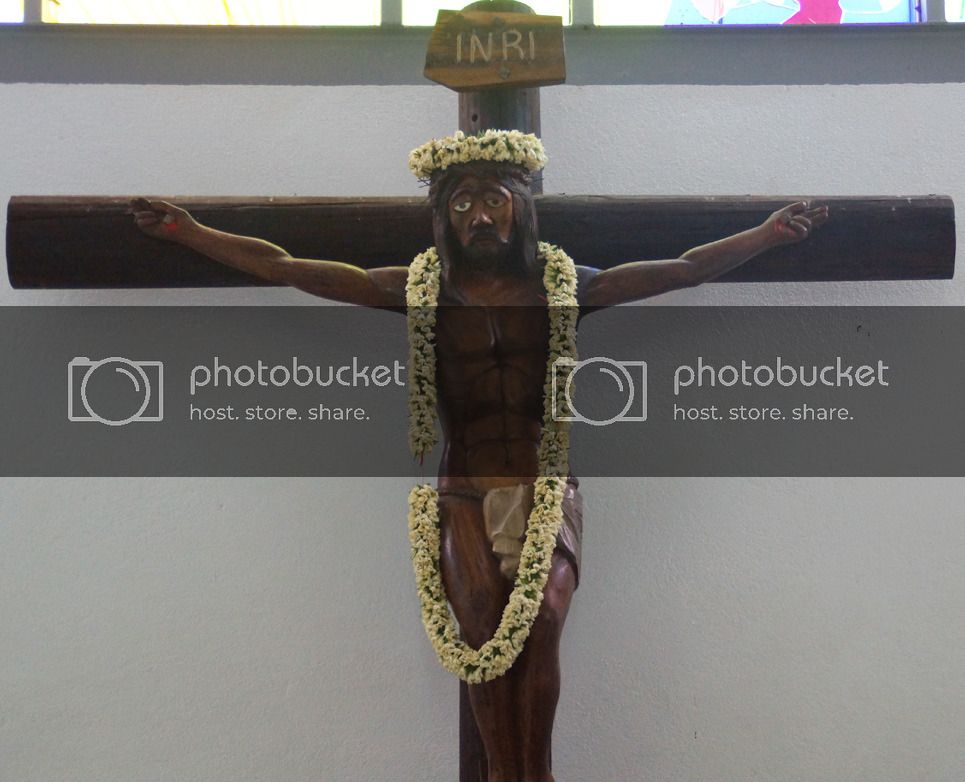- Dec 31, 2010
- 5,742
- 2,874
- 113
- Faith
- Christian
- Country
- United States
In Bora Bora and Papeete Catholic churches. All with hand carved fixtures and crowns of flowers. I took these photos myself while in the French Polynesia.






Welcome to Christian Forums, a Christian Forum that recognizes that all Christians are a work in progress.
You will need to register to be able to join in fellowship with Christians all over the world.
We hope to see you as a part of our community soon and God Bless!



With all due respect to being positive, do you really think that the Holy Spirit would support seriously false doctrine and practices while bringing about a so-called "renewal"? The first step towards renewal and revival is repentance, and the Catholic Church has never repented. Rather they have doubled-down on their false beliefs.
Hi Oz,polemicist
Unfortunately, I am ultrafamiliar with the Toronto Blessing, and it's successor, Catch the Fire. :-(marksman,
That is absolutely false and an hyperbole.
I'm a Christian apologist, polemicist and teacher by gifting. Therefore, you'll find all kinds of articles on my website. Some of these articles will critique teachings of some people. I'm a watchman. Do the following articles point out people's faults?
I will not support Toronto 'Blessing' and Pensacola 'Blessing' with grown people crawling around on the floor in the meetings and barking like dogs. In my view, a church that promotes that behaviour is an abomination before God. Oz
If a person does not repent his affiliation wouldn't matter to God for he has chosen to remain on the outside of the family of God. On the other hand, if a person really has repented again his affiliation would not matter to God. God is no respecter of persons. He is always looking at a person's heart. Judgement is based on what a person has been doing with what he had or did not have. Joining another church group with a better statement of beliefs will not save an unrepentant heart. Always the heart!Actually they are pretty strong on repentance, that's a strong point of the Catholic Church.
Thought I would share a link or 2 about the CCR in Australia
My experience with 'Charismatic movement' began in 1970's.Time to bring up a positive happy thread. The Catholic Charismatic Renewal. Here is a brief video on the history about it, and the powerful movement fueled by the Holy Spirit is still going strong today.
Thankyou for your view. If you don't mind, I will stick with personal experience and study.marksman,
That is absolutely false and an hyperbole.

I'm a Christian apologist, polemicist and teacher by gifting. Therefore, you'll find all kinds of articles on my website. Some of these articles will critique teachings of some people. I'm a watchman. Do the following articles point out people's faults?
I will not support Toronto 'Blessing' and Pensacola 'Blessing' with grown people crawling around on the floor in the meetings and barking like dogs. In my view, a church that promotes that behaviour is an abomination before God.
- Is God eternal and temporal?
- No need to list Old Testament books in New Testament
- Authorship of the Book of Hebrews
- Women in ministry in church history
Oz
Christians are commanded to prove all things and hold fast to that which is good. The false teachings of any group calling themselves Christian (be it Jehovah's Witnesses, Mormons, Catholics, Oneness Pentecostals, etc.) must be examined in the light of Scripture. That is not "bashing" but speaking the truth in love. The fact that there was a Protestant Reformation confirms that there were serious problems with the doctrines and practices of the church of Rome.Why is any thread that mentions the word Catholic taken as an opportunity to bash the Catholic Church?
Christians are commanded to prove all things and hold fast to that which is good.
The false teachings of any group calling themselves Christian (be it Jehovah's Witnesses, Mormons, Catholics, Oneness Pentecostals, etc.) must be examined in the light of Scripture. That is not "bashing" but speaking the truth in love.
The fact that there was a Protestant Reformation confirms that there were serious problems with the doctrines and practices of the church of Rome.
The question must be asked: "If a group has false beliefs, is it even possible that the Holy Spirit will condone and promote those false teachings and give some kind of *renewal* to that church?"
The Tares Among The Wheat: Roman Catholic Errors Spread By The CCR
, practice, and vocabulary. A major portion of the CCR's formal catechetical content was initially authored by laymen - like Ralph Martin - but became streamlined and produced by clergy who had been impacted by the CCR's experiential influence - such as Belgian Cardinal Leon Joseph Suenens, Mexican theologian Salvador Carillo, and American Bishop Joseph McKinney.
In 1973, Kilian McDonnell, a Benedictine priest, authored a statement which delineated a typical sample of the CCR's theological parameters: "..it becomes obvious that those who wish to write within the renewal wish to be Catholic and wish to situate the renewal within the Catholic theological tradition. This is an expression .. of the fidelity of the renewal to the Church." (25) From this, we see that from the perspective of Roman Catholic CCR leaders, classical Catholic theology has been consistently viewed as the basis for the CCR's direction.
The fundamentals of CCR teaching are firmly and irrevocably founded upon Roman Catholic dogma, which - as is often overlooked by ecumenically minded Protestants - continues to uphold incompatible doctrinal positions that directly challenge and contradict the very Reformation principles which birthed the Protestant movement and shape its essential spiritual identity.
The Catholic Charismatic Renewal: Spring Or Winter?
Even many Catholics are not too happy about Pentecostalism and emotionalism coming into their churches.
Josho,
My perspective/comment is based on..
- Experience & observation in 'Protestant Charismatic Renewal' camps..over the years.
---
It is an interesting topic.
- For me, it means..going back to 70's!
'Movement' days.
Bashing is much more defined by *how* something is said, rather than what is actually bieng said.Christians are commanded to prove all things and hold fast to that which is good. The false teachings of any group calling themselves Christian (be it Jehovah's Witnesses, Mormons, Catholics, Oneness Pentecostals, etc.) must be examined in the light of Scripture. That is not "bashing" but speaking the truth in love. The fact that there was a Protestant Reformation confirms that there were serious problems with the doctrines and practices of the church of Rome.
Not my opinions but statements of fact, which can be verified through reliable documents. The errors of the Catholic Church are fully documented. The History of the Christian Church by historian Philip Schaff is recognized as a reliable and accurate work. Here is what is recorded:You don't proved anything - just given your opinions.
Not my opinions but statements of fact, which can be verified through reliable documents. The errors of the Catholic Church are fully documented. The History of the Christian Church by historian Philip Schaff is recognized as a reliable and accurate work.
Here is what is recorded:
CHAPTER VII.
THE SACRAMENTARIAN CONTROVERSIES.
§ 101. Sacerdotalism and Sacramentalism.
The Catholic system of Christianity, both Greek and Roman, is sacramental and sacerdotal. The saving grace of Christ is conveyed to men through the channel of seven sacraments, or "mysteries," administered by ordained priests, who receive members into the church by baptism, accompany them through the various stages of life, and dismiss them by extreme unction into the other world. A literal priesthood requires a literal sacrifice, and this is the repetition of Christ's one sacrifice on the cross offered by the priest in the mass from day to day. The power of the mass extends not only to the living, but even to departed spirits in purgatory, abridging their sufferings, and hastening their release and transfer to heaven.
The Reformers rejected the sacerdotal system altogether, and substituted for it the general priesthood of believers, who have direct access to Christ as our only Mediator and Advocate, and are to offer the spiritual sacrifices of prayer, praise, and intercession. They rejected the sacrifice of the mass, and the theory of transubstantiation, and restored the cup to the laity. They also agreed in raising the Word of God, as the chief means of grace, above the sacraments, and in reducing the number of the sacraments. They retained Baptism and the Lord's Supper, as instituted by Christ for universal and perpetual observance...
...Zwingli and Calvin reduced the sacraments to signs and seals of grace which is inwardly communicated by the Holy Spirit. They asserted the sovereign causality of God, and the independence of the Spirit who "bloweth where it willeth" (John 3:8). God can communicate his gifts freely as he chooses. We are, however, bound to his prescribed means. The Swiss Reformers also emphasized the necessity of faith, not only for a profitable use of the sacrament (which is conceded by the Lutherans), but for the reception of the sacrament itself. Unworthy communicants receive only the visible sign, not the thing signified, and they receive the sign to their own injury.
The Anabaptists went still farther, and rejected infant-baptism because it lacks the element of faith on the part of the baptized. They were the forerunners of the Quakers, who dispensed with the external sacraments altogether, retaining, however, the spiritual fact of regeneration and communion with Christ, which the sacraments symbolize to the senses. The Quakers protested against forms when they were made substitutes for the spirit, and furnished the historic proof that the spirit in cases of necessity may live without forms, while forms without the spirit are dead...
Hows it going bro? U know me right. Christ the King...
Cristo,
I'm not sure I know you, my Aussie mate.
Oz
The saving grace of Christ is conveyed to men through the channel of seven sacraments, or "mysteries," administered by ordained
Unfortunately, I am ultrafamiliar with the Toronto Blessing, and it's successor, Catch the Fire. :-(
I was somewhat intrigued by your comments on the "Author of Hebrews". I don't know much about FF Bruce, but as is often the case when one reads someone's commentary instead of the source, they come to the same erroneous conclusion you did. Actually, Bruce got the book and chapter right, but failed to find the defining verse. Athanasius gives a complete list of each book in New Testament, and it's author which had been repeated so many times throughout church history since the very beginning, that he thought it might be risking tedium to repeat them once again:
Athanasius Archbishop of Alexandria AD 328 – 373
Easter/Festal Epistles Letter xxxix
"5. Again it is not tedious to speak of the [books] of the New Testament. These are the four Gospels, according to Matthew, Mark, Luke, and John. Afterwards, the Acts of the Apostles and Epistles (called Catholic), seven, viz. of James, one; of Peter, two; of John, three; after these, one of Jude. In addition, there are fourteen Epistles of Paul, written in this order. The first, to the Romans; then two to the Corinthians; after these, to the Galatians; next, to the Ephesians; then to the Philippians; then to the Colossians; after these, two to the Thessalonians, and that to the Hebrews; and again, two to Timothy; one to Titus; and lastly, that to Philemon. And besides, the Revelation of John."
(Nicene and Post Nicene Fathers, Vol 4)
I have the highest regard for Athanasius, and have no doubt whatsoever
that Paul was the author of "Paul's Epistle to the Hebrews".

